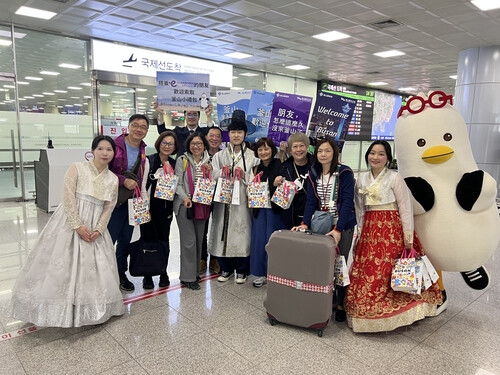
SEOUL, South Korea – Recently, the Taiwanese people's love for Korea has been extraordinary. The number of Taiwanese who visit Korea once and become "repeaters" is rapidly increasing, and the number of arrivals through local airports is nearing half of the total, surpassing existing patterns of inbound tourism to Korea. In response to this fervent interest from Taiwanese visitors, the Korea Tourism Organization (KTO) successfully held a K-Tourism roadshow, expanding its reach to the southern regions of Taiwan, and is accelerating the expansion of K-Tourism.
Taiwanese Tourists' Love for Korea: 'Currently Ongoing'… Rapid Increase in Return Visit Rate
"The number of Taiwanese visiting Korea multiple times a year is increasing," emphasized Ho Soo-young, head of the KTO's Taipei branch, highlighting the noticeable increase in the return visit rate of Taiwanese visitors to Korea. This demonstrates the strong desire of Taiwanese people not just to visit Korea for the first time, but to be continuously drawn to its diverse charms.
In fact, according to KTO statistics, approximately 1.47 million Taiwanese tourists visited Korea in 2023, a 53% increase from the previous year. This figure significantly surpasses the pre-pandemic peak of 1.26 million in 2019, firmly establishing Taiwan as the third-largest inbound market for Korea, following Japan and China. Statistics from January to April 2024 also show this growth continuing, with Taiwanese tourist numbers expected to increase further this year.
This surge in return visits is overwhelmingly influenced by the Korean Wave (Hallyu). As familiarity with Korean culture increases through K-POP, K-Drama, and other Hallyu content, Taiwanese people perceive Korea not just as a travel destination but as a "cultural hub to experience." Furthermore, geographical proximity for easy access, a variety of flight options, and relatively affordable travel costs also contribute to repeat visits.
K-Tourism Roadshow Expands to Southern Taiwan… Enthusiastic On-Site Response
To meet the unabating love for Korea among Taiwanese, the KTO held a 'K-Tourism Roadshow' in Kaohsiung, a southern Taiwanese city, for three days starting May 30. Expanding Korean tourism promotional activities, which previously focused on northern Taiwan, to the southern region is considered a highly strategic move. Unlike the north, southern Taiwan has a relatively less developed public transportation infrastructure and strong regional cultural characteristics, necessitating a new approach to attract tourists.
Thirty-three domestic tourism-related organizations participated in the Kaohsiung roadshow, showcasing Korea's diverse attractions. Booths featuring various themes such as culinary experiences, introductions to local festivals, K-POP dance experiences, Hanbok (traditional Korean clothing) experiences, and demonstrations of new tourism content drew enthusiastic interest from local consumers. In particular, information about the latest Korean drama filming locations and hidden gems, previously not well-known, gained significant popularity.
The popularity of the roadshow far exceeded expectations. A remarkable 47,000 local Taiwanese consumers visited the venue over the three days. This clearly demonstrates the immense potential demand for Korean tourism among consumers in southern Taiwan. Through this roadshow, the KTO successfully raised awareness of Korean tourism in southern Taiwan and laid a strong foundation for converting potential tourists into actual visitors.
Beyond Seoul: A New Korean Travel Trend Among Taiwanese
The most notable change in the Taiwanese fervor for Korean travel is the sharp increase in the use of local airports. Last year, one out of every two Taiwanese visitors arriving in Korea entered through a local airport, not Incheon International Airport.
Looking at the specific entry routes for Taiwanese visitors arriving in Korea, Incheon International Airport (50.1%) still accounts for more than half, but the proportion of entries through local airports such as Gimhae (25.1%), Jeju (9.2%), Gimpo (8.5%), Daegu (5.1%), and Cheongju (1.9%) accounts for approximately 49.9% of the total, showing a noticeable dispersion.
This indicates that Taiwanese tourists are increasingly not just staying in Seoul and the metropolitan area but are keen to experience diverse local cities and regional characteristics of Korea. The beaches and food of Busan, the beautiful natural scenery of Jeju, the modern alleyways and festivals of Daegu, and the historical sites of Cheongju – each region's unique charm is appealing to Taiwanese visitors. This trend suggests that vitalizing local tourism is essential for the continued growth of Korean tourism.
Tailored Strategies and Future Vision for Local Tourism Revitalization
The KTO is actively pursuing various tailored strategies to cater to the high interest of Taiwanese in local travel.
First, the KTO selected 11 Taiwanese travel agencies to develop group tour packages for seven local governments, including Busan, Daegu, Gwangju, Ulsan, Jeollanam-do, Gyeongsangbuk-do, and Gyeongsangnam-do. These travel agencies are systematically supported through the 'Regional Tourism Product Contest,' which provides annual promotional marketing assistance. This focuses not just on selling tourism products but on developing high-quality tourism content that highlights regional characteristics and effectively promoting it.
Additionally, the KTO is actively promoting the charms of Korean local cities through close cooperation with the Taiwanese travel industry. Ho Soo-young, head of the Taipei branch, stated, "In April and May, we invited over 20 leading Taiwanese travel agencies twice to showcase new tourism content in the Daegu, Gyeongsangnam-do, and Gyeongsangbuk-do regions." Such familiarization tours (fam tours), which directly invite local travel industry professionals to visit local tourist attractions and identify appealing elements from a local perspective, are highly likely to lead to actual product development.
Through these comprehensive efforts, the KTO plans to continue discovering and promoting new tourism content to further increase the return visit rate of Taiwanese visitors to Korea. The ultimate goal is for Taiwanese tourists to discover hidden charms in more diverse regions of Korea beyond Seoul and experience profound Korean culture. The increase in arrivals through local airports is also expected to have a positive impact on the revitalization of Korea's regional economies. All eyes are on what new horizons K-Tourism will open as Taiwanese tourists' love for Korea continues.
[Copyright (c) Global Economic Times. All Rights Reserved.]






























